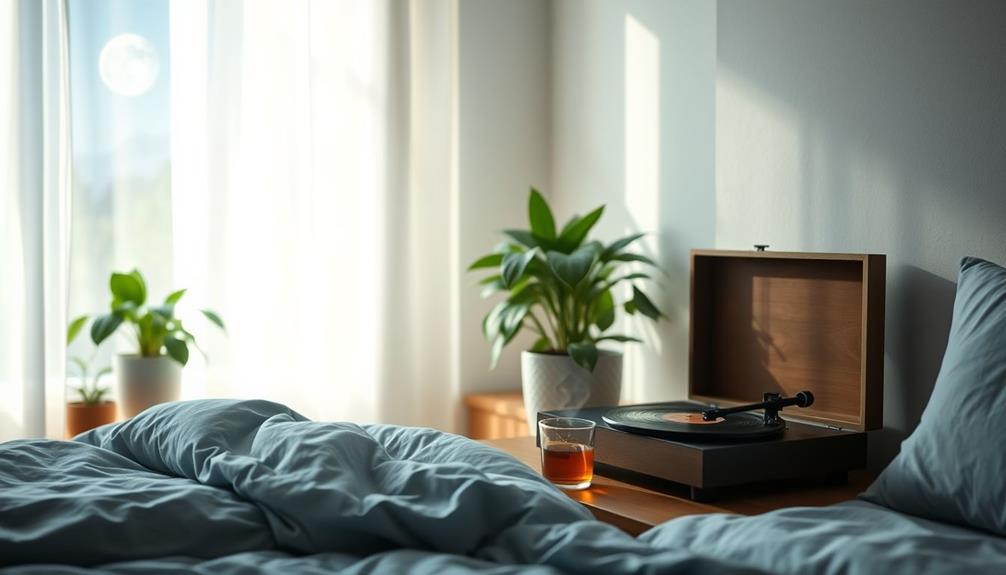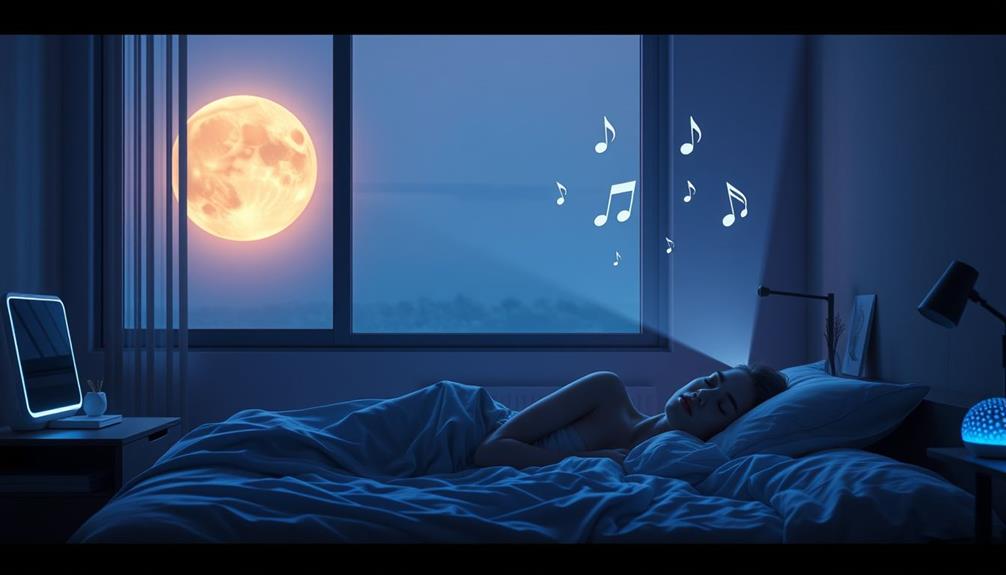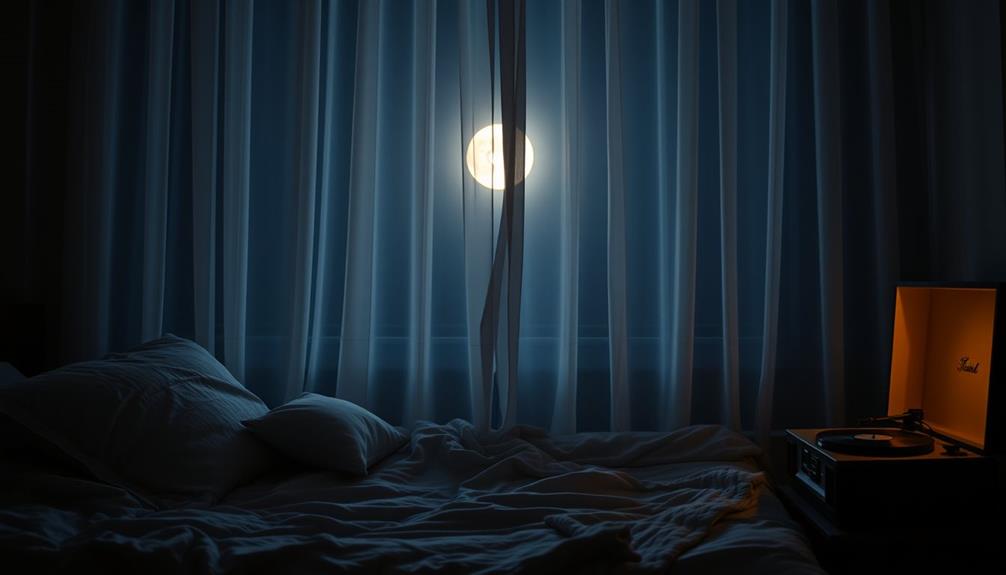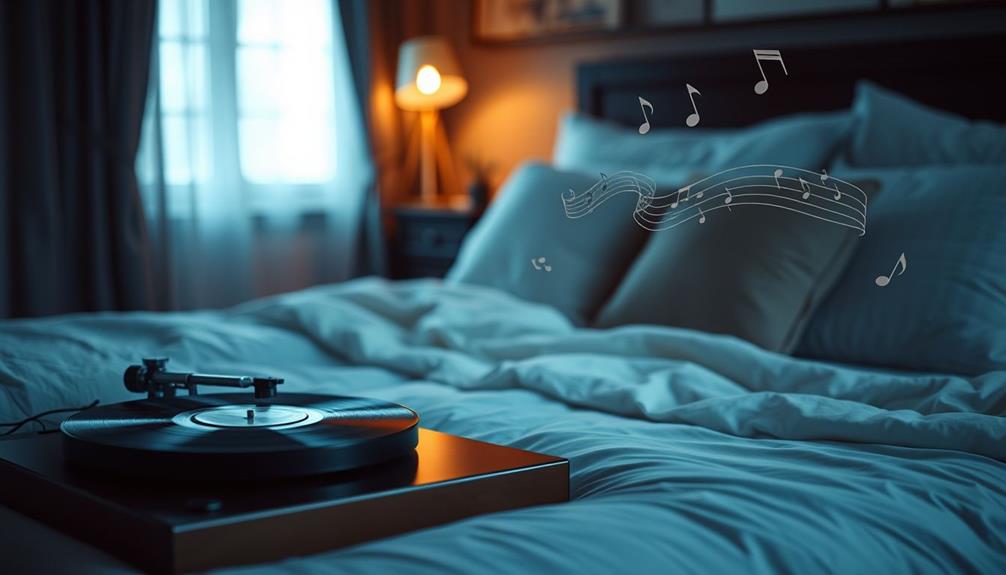Music therapy's proven effectiveness makes it a great choice for combating insomnia. By listening to calming, slow-tempo music, you can reduce the time it takes to fall asleep and enhance overall sleep quality. This approach lowers stress hormones and boosts feel-good chemicals in your brain, helping ease anxiety. Customizing your playlist with familiar tunes can make a big difference. Incorporating relaxation techniques, like gentle yoga, further amplifies these benefits. With so many options available, you'll find the perfect combination for your needs. There's so much more to explore about how music can transform your sleep experience. Additionally, using music to ease test stress is another way this therapeutic tool proves its versatility. The same calming playlists that improve sleep can also help students and professionals stay focused and relaxed during high-pressure situations. By fostering a sense of calm and balance, music becomes a powerful ally not only for better rest but also for navigating daily challenges with less anxiety.
Key Takeaways
- Music therapy effectively reduces insomnia severity and enhances sleep initiation, offering a non-pharmacological alternative to medications.
- Slow-tempo music (60-80 BPM) promotes relaxation by aligning with natural body rhythms, aiding in faster sleep onset.
- Customizable playlists with familiar, calming music can significantly decrease anxiety and improve overall sleep quality.
- Incorporating relaxation techniques, like gentle yoga, alongside music therapy amplifies its therapeutic effects on sleep.
- Future research is needed to explore the long-term impacts of music therapy on insomnia and health outcomes.
Overview of Music Therapy
Music therapy has gained traction as a powerful tool for tackling insomnia and improving sleep quality. It utilizes music to address emotional, physical, and cognitive needs, making it particularly effective for individuals suffering from insomnia.
By listening to calming music before bedtime, you can markedly reduce sleep onset latency and enhance overall sleep efficiency. Many people notice improvements in sleep quality as early as their first night. Incorporating relaxation techniques, such as gentle yoga stretches, into your nighttime routine can further enhance the calming effects of music therapy.
The therapeutic effects of music therapy stem from its ability to lower stress hormones like cortisol, promote relaxation, and boost dopamine release. These elements work together to create a conducive environment for restful sleep.
One of the best aspects of music therapy is its customization; you can choose familiar, slow-tempo music without lyrics, ideally around 60-80 beats per minute, to suit your preferences.
Moreover, music therapy offers a non-invasive treatment option for sleep disturbances, making it a low-cost alternative to pharmacological interventions. With no notable side effects, it provides a safe and effective way to seek relief from insomnia.
Impact of Sleep Deficiency

Sleep deficiency affects millions of people, leading to a host of serious health consequences. When you struggle with insomnia disorder, your sleep quality deteriorates, impacting your overall health. Chronic insomnia can lead to significant issues like heart disease, diabetes, and even depression.
It's not just your physical health at stake; your mental health suffers too, increasing anxiety and pain perception. The importance of understanding both fields cybersecurity and ethical hacking in today's digital age also highlights how stress from online threats can contribute to sleep issues.
The urgency for effective interventions is clear. With the estimated annual economic cost of insomnia-related work absenteeism in the U.S. reaching $63.2 billion, sleep deficiency isn't just a personal issue; it's a societal one.
Many turn to sleep medications, but there's been a staggering 293% rise in prescriptions from 1999 to 2010, showcasing our growing reliance on pharmacological solutions.
However, relying solely on medications isn't enough. The connection between insomnia and increased hospitalization rates and potential suicide risks, particularly among older adults, highlights the need for diverse treatment options.
Exploring alternatives, like music therapy, can provide a holistic approach to improving sleep quality and addressing the root causes of sleep deficiency.
Music's Therapeutic Benefits

While many turn to medications for relief from insomnia, music therapy offers a compelling alternative that can enhance your sleep quality. Research shows that music therapy can effectively reduce insomnia severity and improve sleep initiation, rivaling the impact of prescription sleep medications.
With about 30% to 40% of adults experiencing insomnia annually, exploring non-pharmacological interventions like music therapy is essential. Additionally, incorporating AI-generated music tailored for relaxation can further personalize and enhance the therapeutic experience.
Listening to slow-tempo music, typically around 60-80 beats per minute, promotes relaxation and aligns with your body's natural rhythms. Familiar tunes, especially those without lyrics, can greatly shorten your sleep onset time, with studies reporting reductions from 27-69 minutes to as little as 6-13 minutes.
These therapeutic benefits stem from music's physiological effects, including lowering cortisol levels and boosting dopamine release, which help ease anxiety associated with sleep issues.
Practical Applications of Music

Establishing a calming bedtime routine can make a significant difference in your sleep quality. Incorporating music therapy into your evening rituals creates a soothing environment that promotes relaxation.
To further improve your nighttime routine, you might consider integrating essential oils for relaxation alongside your music therapy practices. Start by curating personalized playlists featuring familiar, slow-tempo music—aim for tracks with 60-80 beats per minute. This familiarity helps reduce anxiety and enhances the effectiveness of music as a sleep aid.
Consider working with a music therapy practitioner who can design individualized interventions tailored to your specific insomnia symptoms and preferences. They can guide you in selecting the right calming music and developing strategies to improve your overall sleep hygiene.
Using portable speakers or streaming apps allows for easy access to your playlists, and setting timers guarantees that your music won't disrupt your deeper sleep phases.
This consistency in your evening routine not only fosters relaxation but also reinforces the calming effect of music on your mind and body. Over time, you'll likely notice a marked improvement in your sleep quality, making it easier to drift off and stay asleep.
Embrace the power of music to enhance your nightly routine and combat insomnia effectively.
Future Directions in Research

As you explore the benefits of music therapy for insomnia, it's clear that future research holds significant potential for enhancing our understanding of this practice.
Integrating techniques from fields like somatic therapy may offer new insights into how music can influence the mind-body connection and promote relaxation.
To truly grasp how music therapy can improve sleep quality, we need to focus on several key areas:
- Identifying specific music characteristics, such as tempo, rhythm, and genre, that effectively promote sleep induction.
- Investigating the long-term effects of sustained music therapy interventions on insomnia symptoms and overall health outcomes.
- Exploring the impact of personalized music selections versus standardized playlists, considering individual preferences and cultural backgrounds.
- Conducting larger-scale, multi-center randomized controlled trials to confirm existing findings and enhance the generalizability of music therapy's benefits for insomnia.
- Examining the integration of music therapy with other therapeutic modalities, like cognitive-behavioral therapy for insomnia (CBT-I), to assess combined effects on sleep improvement.
Frequently Asked Questions
Can Music Therapy Help With Insomnia?
Yes, music therapy can help with insomnia. By listening to calming, slow-tempo music, you'll likely find relaxation increases, sleep onset becomes easier, and overall sleep quality improves, offering a soothing alternative to medications.
What Is the Best Music to Listen to for Insomnia?
For insomnia, you should listen to relaxing music with a tempo of 60-80 beats per minute. Choose familiar, instrumental tracks from genres like classical or ambient to create a calming atmosphere that promotes restful sleep.
What Music Is Scientifically Best for Sleep?
To enhance your sleep, listen to relaxing music with a tempo of 60-80 beats per minute. Genres like classical or ambient, particularly familiar tunes, effectively promote relaxation and reduce sleep onset time considerably.
How to Cure Insomnia Music?
Imagine drifting on a cloud of soothing melodies. To cure insomnia with music, choose slow-tempo tracks, create a calming bedtime routine, and immerse yourself in familiar tunes to enhance relaxation and embrace restful sleep.
Conclusion
Incorporating music therapy into your routine could be a game-changer for your insomnia. Research shows that certain melodies can lower anxiety and promote relaxation, making it easier to drift off to sleep. So, why not give it a shot? You might just discover that your favorite tunes not only entertain but also heal. As science continues to explore this connection, you could find yourself in a sweet symphony of restful nights and revitalized days.










